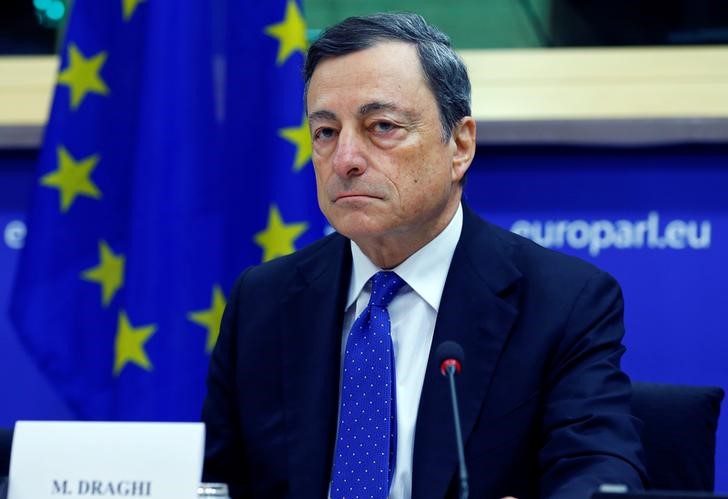By Francesco Canepa
FRANKFURT (Reuters) - Stalling recovery would be the greatest risk facing the euro zone's economy, the head of the European Central Bank said on Monday, underscoring, before an important policy decision next week, the ECB's focus on supporting growth.
The ECB is due to decide next week on whether to extend beyond March its 1.74-trillion-euro (1.48 trillion pounds) bond-buying programme, the centrepiece of its much-criticised stimulus policy, that some say has created bond and property price bubbles and should be wound down.
Mario Draghi's comments, in response to a question from an EU parliamentary committee about the risks to financial stability from ultra-easy monetary policy, suggest the ECB remains firmly focussed on stimulating growth.
"Right now the greatest risk comes from impaired growth," Draghi said. "The greatest risk comes from the possibility the recovery doesn’t firm up and stalls."
The ECB has pushed its benchmark interest rate below zero, bought 80 billion euros of bonds a month and given free loans to banks and lowered borrowing costs to bring euro zone inflation back to its target of almost 2 percent.
Inflation is slowing picking up, having reached 0.5 percent in October, and is expected to exceed 1 percent next year.
But Draghi said ECB rate setters would look for ways to preserve "very substantial" stimulus when they meet on Dec. 8 and assess different options for their bond-buying programme.
"At our monetary policy meeting in December we'll assess the various options that would allow the Governing Council to preserve the very substantial degree of monetary accommodation necessary to secure the sustained convergence of inflation towards (target)," Draghi said.
SCARCITY AND BOND LENDING
After over 1-1/2 years of aggressive bond-buying, the ECB owns over a quarter of the debt of countries such as Germany and faces the threat of running out of paper to buy that fits the many constraints of its scheme.
Draghi said the programme could be adjusted. Sources have told Reuters the ECB might buy fewer bonds from countries where scarcity is starting to emerge or buy more of each bond issue.
"We are in a position to address this problem," he said. "The programme is sufficiently flexible that can be revisited."
Confirming a Reuters story from last week, Draghi said the ECB was "upgrading" its securities-lending programme, which allows banks to borrow some of the bonds it has bought, typically to use them as collateral for short-term secured loans, known as "repo".
"In the previous weeks it (securities lending) was falling short of what would be optimal," he said.
"We are gradually upgrading this and it’s recognised by the Governing Council as a need-to-do."
He stressed securities lending was "very much in the hands" of the euro zone's national central banks, which have bought some 80 percent of the bonds the ECB has purchased as part of its quantitative easing programme.
Sources have told Reuters the ECB is looking for ways to lend out more of its bonds and the issue would be discussed at the ECB's Dec. 8 meeting, although a decision might come later.
Possible changes include reducing charges for firms which fail to return the bonds they have borrowed on time, accepting new types of collateral and extending the duration of loans.
